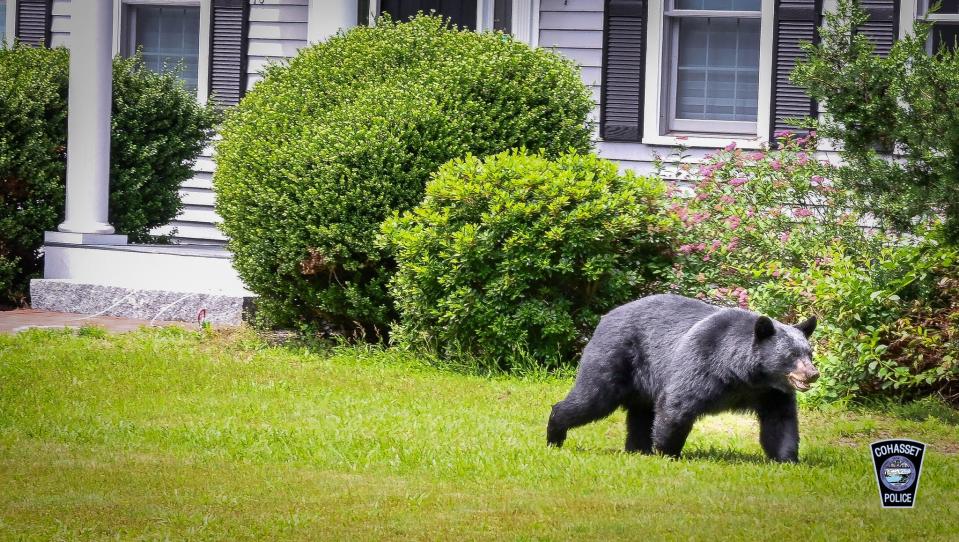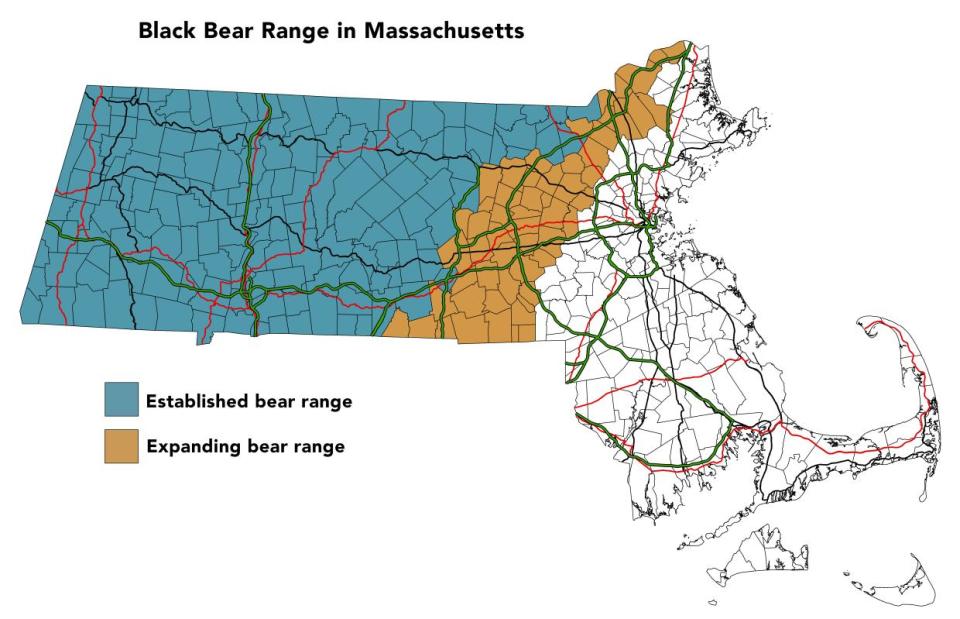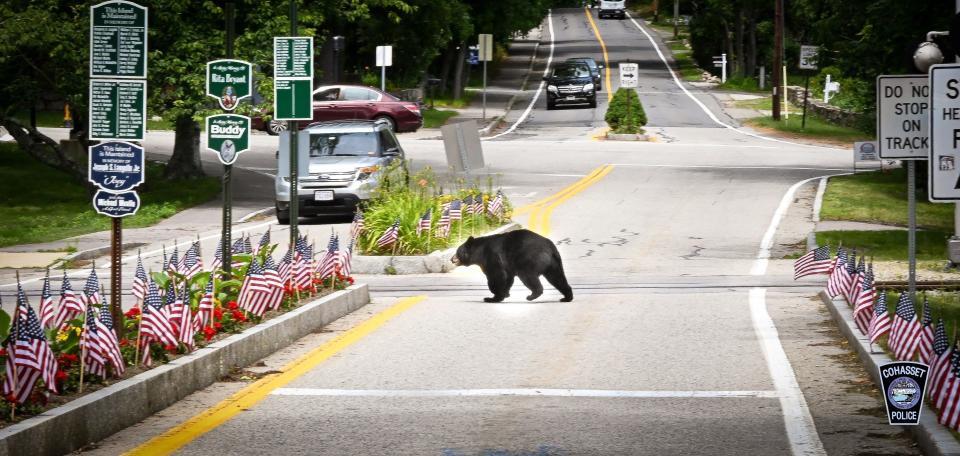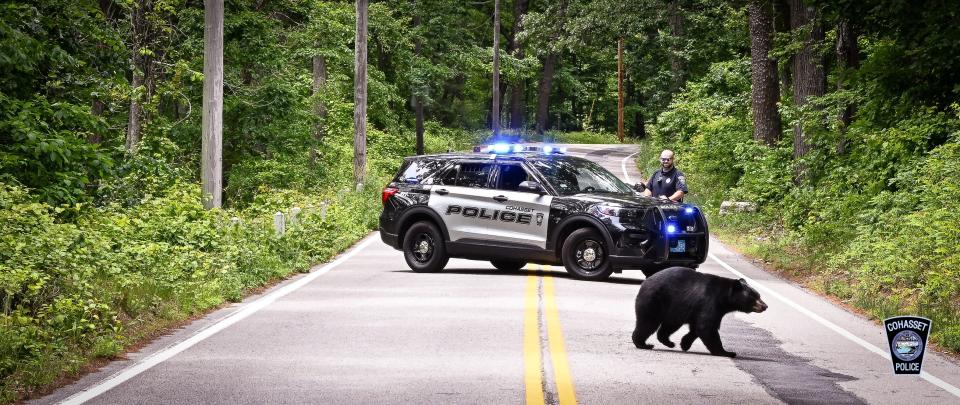Where is our South Shore black bear? He is awful quiet
South Shore and Southeastern Massachusetts got a taste of life with black bears last spring and summer, with frequent sightings reported from Quincy to Plymouth to New Bedford.
Things have been quiet this winter, of course, because it is hibernation season. Most of us immediately think of bears when we think of hibernation, but there are many mammals that hibernate. Bears can go for about 100 days without having to wake up to eat. But most mammals who hibernate are much smaller. Edible dormice is a tiny rodent that can hibernate for more than 11 months, according to National Geographic.
So now that bear hibernation season is over, where are the bears?
Have there been any black bear sightings in the South Shore area yet in 2024?
The short answer is no, but there is a but.
"We did have one report from someone who contacted us in Plymouth who said the shepherd's hook on their bird feeder had been bent downwards," said MassWildlife black bear biologist David Wattles. "Given something actually bent the shepherds hook, we're assuming it was a bear."
W. Bridgewater cop spots bobcat in tree: What was it doing here? Are they dangerous?
How many black bears are there on the South Shore?
As of now, there is likely just one black bear, and he seems to have settled in the greater Plymouth area, Wattles said.
A second South Shore bear dubbed Pumpkin, seen all over South Shore last year, was killed in November by a hunter in Hanson during the regularly scheduled hunting season,
One of the male bears has been in the South Shore/Southeastern Massachusetts area for the last few years. Wattles said. The second bear likely came in through the Easton and Sharon area.
"I think then maybe the bear from Easton moved in the same direction as the other bear, and that's because we were starting to get these concurrent reports of multiple bears down there, but we're still talking about a very, very small number of bears that are down in that area," he said.

More black bears, of which they are now more than 5,000 in the state, could come into the area at any point, Wattles said. The state's bear population has an expected annual increase of 8%. Last year, there were about 4,500 bears in Massachusetts.
“At the same time every year for the past four or five years, we have had reports of bears moving through Southeastern Mass., so I fully anticipate that another bear is going to disperse from its established range and move through the southeast," he said "It seems to be the pattern.”
Messages ignored on living with black bears
Wattles said the large number bear sightings last year on the South Shore helped MassWildlife teach more people how to cohabitate with the normally non-aggressive creatures.
“A lot of towns were exposed to the presence of bears, many for the first time, and so were local police departments,” he said. “People started to warm to the idea of what we were trying to say, and that is that just simply having a bear in your town is not a public safety risk.”
Wattles said life with bears is likely to become the new norm in the eastern part of the state. Despite the occasional appearance of black bears, which are the only bear species in the state, the South Shore is not considered part of their normal range.

"There are many, many places in Western Massachusetts where it's not a single bear for a dozen towns, it's a dozen bears or more for a single town, so we know these animals can live around us” he said. “You don't have to close the schools at recess and all those kinds of things.”
'Your bird feeders are killing those bears'
Getting used to seeing bears more often is one thing. Getting people to follow simple steps offered by MassWildlife is a whole other thing, Wattles said.
“The bigger learning curve is going to be getting the public to actually take that messaging seriously and change their behaviors,” he said. “And so, the thing I'm trying to say in a different way to the public is that your bird feeder is killing those bears. It is training those bears to come to backyards to find food.”
That is especially true at this point in the season, when bears are coming out of hibernation and begin searching for food, according to Wattles.
“There’s not a lot of food, and it’s not super nutritious,” Wattles said of the bears' current eating situation. “They are still basically on starvation rations this time of year and still losing weight, so this is also a time where they can really key in on those human-associated foods that are available.
Put another way: Bears rarely turn down a snack.

Wattles describes the bird feeders as a gateway food source that can lead bears to seek out more options in populated areas, whether it's garbage cans, gardens or livestock, which can then create situations where bears can be deemed dangerous.
Prior to Pumpkin being killed by the hunter's arrow, the bear was set to be put down if seen late last fall by Hanson police after several livestock attacks.
"They're breaking into sheds because there's bird feeders or bird seed stored in there," Wattles said. "They're breaking into chicken coops, beehives, attacking goats and sheep. It's bird feeders that are the start of all that.”
“Keeping livestock safe comes down to one thing. Electric fencing, electric fencing, electric fencing,” he said.
What's next for the black bear in the Plymouth area?
Wattles said the bear that settled in the Plymouth area could remain close to home or wander as it did last year in search of food and a mate.
Although layman's logic would suggest the nuts and berries that make up the ideal staples of a bear’s diet would be plentiful after months and months of rain, the weather, like the bears themselves, can be unpredictable; Wattles said.
“While we've had a wet spring, we've seen it before where you have a wet spring then suddenly, we don't get any rain and drought conditions can develop very quickly," Wattles said. "It remains to be seen how that plays out."
More bears likely to come to the region
Bears face significant hurdles moving from one large area to the next due to the barriers and dangers posed by busy highways and streets, but that still hasn't stopped their eastward expansion, Wattles said. The bears can travel up to 10 miles per day.

"We have enough bears on our fringe range that are now feeding in the area, so I do anticipate some bear activity down there." he said "It's just difficult to predict exactly. It takes that bear to make that move.”
That move could include females and their cubs.
While females will move to a different area than their mother as they begin having cubs of their own, they often don't move too far, Wattles said, although that's not always the case.
"We know from research that sometimes female will suddenly move a very long distance and cross a lot of barriers," he said,
How big are black bears?
Females weigh can weigh between 100 and 400 pounds and males between 130-600, according to information from MassWildlife, Female bears can double their size over the summer in preparation for hibernation.
When bears hibernate, their body temperature drops from 100 degrees Fahrenheit to 88 degrees Fahrenheit, and their heart rate goes from 50 beats a minute to 10, according to the Massachusetts Audubon Society, which notes that the temperature drop is similar to their summertime body heat.
Mass Audubon also said black bears don't urinate during hibernation. Bears also don't eat, drink or defecate while in their den. Instead, they metabolize fat to produce water and food, and recycle waste. The nitrogen produced from breaking down urea, a waste product found in urine, helps bears maintain muscle mass and healthy organ tissue.
When should people contact MassWildlife?
“If someone sees the bear, fantastic. Enjoy the sighting, but don't try to get closer to take a photo or anything like that," Wattles said. "Don't go out to try to pursue the bear, it's best to give the animal space."
He said not every sighting needs to be reported to MassWildlife or the police, but there are some exceptions to that.
"If someone sees a mother with cubs, that is definitely information that we would want to know, that would be a new piece of information for us," Wattles said. "We would love to capture the female and collar here so we can learn more about more detail about how bears are using the Southeastern part of the state."
MassWildlife can be contacted online at MassWildlife.org, where more information on living with black bears is available. The agency can also be reached by phone at 508-339-6300.
How do I keep bears away?
MassWildlife gave tips on how to prevent negative encounters with bears.
Remove all food sources from your yard and neighborhood
Never intentionally feed bears
Avoid feeding birds; birdfeeders, suet and spilled seed attract bears
Clean barbecue grills and grease traps
Avoid using open compost
Never leave trash bags outside
What do I do if I encounter a bear?
Talk to the bear in a calm voice
Slowly back away from the bear; do not run
If the bear makes contact with you, fight back
This article originally appeared on The Patriot Ledger: Any bear sightings yet on the South Shore?

